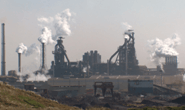Government/Policy

August 17, 2024
Leibowitz: British steelmaking is transitioning. Is change coming to the US too?
Written by Lewis Leibowitz
In Britain, the handwriting is on the wall. Are we reading the same writing in the US?
Based on the pressures of addressing climate change and carbon emissions, British steel companies face a stark choice: Push for government subsidies to convert production from blast furnaces to electric-arc furnaces (EAFs) – or go out of business in Britain.
Port Talbot closes BFs, shifts to EAFs
Last week, Tata Steel, the UK’s largest steel producer, announced plans to close a major production plant in Wales. That will make nearly 3,000 workers redundant. The union representing those workers, of course, is crying foul. But is it really foul?
The Port Talbot, Wales, plant employs about 5,000 workers. Tata plans to shutter two blast furnaces there, replacing them by 2027 with an EAF plant. The net job loss: about 2,800 workers, or more than 50%.
The changes threaten the town of Port Talbot with the loss of critical (and well-paying) employment. Politicians are understandably worried. The union complains that the transition is too quick. The union and the company also argue about whether certain steel products can even be made with EAF steel.
Both sides have a point about that. But the trend clearly favors EAF steelmaking. In the US and elsewhere, “minimills” have expanded their product offering. No longer can it be said that only long products can be made in scrap-based minimills, while truly high-purity steels for automotive, pipelines, shipbuilding, and appliances must be made in blast furnaces.
How long will the integrated business model work?
The business model for traditional blast furnace companies is changing as a result. Giant steel mills can no longer rely on an indefinite “baseline” demand for products that can only be made in blast furnaces. There are some products where blast furnace steel still predominates, such as automotive steels, plate for ships, and pipelines. But EAFs are making inroads in these product lines as well.
The inconvenient truth: Multimillion-ton blast furnace plants (in Britain and the US) can no longer produce as much steel because the buyers aren’t there anymore. There are, of course, domestic buyers and foreign buyers. In both the US and Britain, foreign suppliers have captured large market shares in both countries. Trade remedy actions have proliferated, especially in the US. But new products that can only be made abroad are an increasing feature of both markets.
To survive over the long term, blast furnace producers must adapt to new market conditions. Serving global markets requires competition with China, which has largely been shut out of the US market. Britain has not been able to do that as effectively. Indeed, the British steel industry is principally owned now by Indian (a delicious irony) and Chinese parents.
Change requires more than trade protections and handouts
Competing in export markets will require US companies to become much more efficient and cost-competitive than they are now. The current protective regime is not going to help the industry get where it needs to be.
Of course, environmental concerns also are increasingly important. The summer of 2024 increased attention to global warming, with heat indexes setting records across the northern hemisphere. While steel is still an important product for modern life, substitutes that are more climate-friendly will continue and increase. And while all steel producers are under pressure to make progress on clean steel, the blast furnace companies must make more progress on that than the minimills.
British companies have chosen to transition away from blast furnace production to EAF production. That hard of a turn may not be right for the US for a variety of reasons. The defense sector, for example, needs armor plate for ships, that still needs to be made from “virgin” steel. It’s a similar story for certain applications in transportation and for the energy grid. But demand volumes for these highly specialized products may require scaling back the companies that make blast furnace steel.
The financial resources necessary to manage even a partial transition away from blast furnace production are huge, and the political challenges are too. Companies that need to transition the most may not have enough financial staying power to handle it. That is why, IMHO, the Nippon-US Steel deal makes sense. Government handouts sufficient to guide this transition don’t seem to be in the cards.
Editor’s note: This is an opinion column. The views in this article are those of an experienced trade attorney on issues of relevance to the current steel market. They do not necessarily reflect those of SMU. We welcome you to share your thoughts as well at info@steelmarketupdate.com.







